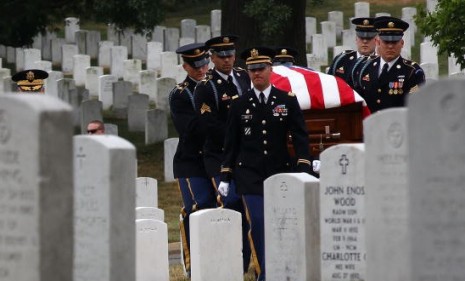The Army's suicide epidemic: A concise guide
June was the deadliest month for Army suicides since Vietnam. What's behind this record-breaking, tragic rise?

A free daily email with the biggest news stories of the day – and the best features from TheWeek.com
You are now subscribed
Your newsletter sign-up was successful
June was the worst month for U.S. Army suicides since Vietnam, the Defense Department says, with 32 soldiers taking their own lives (slightly more than one a day), bringing the six-month total to 145 suicides. This puts 2010's numbers on track to beat 2009 figures, when 245 soldiers ended their lives. What's going on — and why now? (Watch a Russia Today report about the suicide numbers)
How do the June deaths break down?
Twenty-one of the 32 soldiers were on active duty, seven of them in Iraq or Afghanistan. The other 11 were non-active National Guard troops or Army Reservists. Ten of the soldiers had completed between two and four combat deployments. (Note: These numbers don't include veterans, whose suicide numbers are also on the rise.)
The Week
Escape your echo chamber. Get the facts behind the news, plus analysis from multiple perspectives.

Sign up for The Week's Free Newsletters
From our morning news briefing to a weekly Good News Newsletter, get the best of The Week delivered directly to your inbox.
From our morning news briefing to a weekly Good News Newsletter, get the best of The Week delivered directly to your inbox.
What's behind the increase?
There's no conclusive explanation. Col. Chris Philbrick, the director of the Army Suicide Prevention Task Force offers the same hypothesis he's offered in the past: "Continued stress on the force" from the two long-running wars. Other Army officials theorize that the U.S. economic slump might have contributed to the deaths, especially among National Guard and Army Reserve troops.
What do people outside the Army say?
Many blame Army culture for stigmatizing mental stress as a sign of weakness. The civilian psychological community has made great strides in combating that perception, says Dr. John Grohol at PsychCentral, but the Army has not done enough to follow suit. Instead, they blame "the people who commit suicide."
A free daily email with the biggest news stories of the day – and the best features from TheWeek.com
What is the Army doing to combat suicide?
The Pentagon has a 24-hour suicide hotline and has just unveiled a new suicide prevention video, called "Shoulder to Shoulder: I Will Never Quit on Life," featuring real soldiers who have received help for psychological issues. An earlier 2008 video "sucked," says Philbrick. It mixed real soldiers with actors, and was full of "Pentagon speak" with little connection to the experiences of front-line soldiers.
Will the new tactics work?
Philbrick is optimistic, although he says "caring, concern, and decisive leadership" on the part of field commanders remains a crucial factor. Grohol is less impressed: "It just doesn’t seem like the Army 'gets it.'" Instead of individual, tailor-made counseling, the Army offers "group therapy" to soldiers on the way back from combat, an intervention technique he considers "ludicrous" and doomed to failure.
How does the Army commemorate suicide deaths?
It's largely up to the unit commander, although Gen. Peter Chiarelli, the Army's vice chief of staff, recently urged commanding officers to give soldiers who commit suicide in war zones the same memorial service that the fatally wounded receive. The families of suicide soldiers, unlike those mourning other dead servicemen, don't receive condolence letters from the president.
Sources: Yahoo News, Washington Post (2), Fox News, UPI, PsychCentral
-
 Why is the Trump administration talking about ‘Western civilization’?
Why is the Trump administration talking about ‘Western civilization’?Talking Points Rubio says Europe, US bonded by religion and ancestry
-
 Quentin Deranque: a student’s death energizes the French far right
Quentin Deranque: a student’s death energizes the French far rightIN THE SPOTLIGHT Reactions to the violent killing of an ultraconservative activist offer a glimpse at the culture wars roiling France ahead of next year’s elections
-
 Secured vs. unsecured loans: how do they differ and which is better?
Secured vs. unsecured loans: how do they differ and which is better?the explainer They are distinguished by the level of risk and the inclusion of collateral